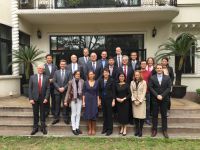The Consulate General of Germany in Shanghai supports German companies and researchers from the provinces Anhui, Jiangsu, and Zhejiang by organizing a German Science Circle which meets in Shanghai. These meetings are always very interesting and good opportunities for exchanging thoughts. Yesterday, I attended such a meeting with the focus Nanjing, which is the capital of Jiangsu and one hour by train from Hefei. There were two highly interesting presentations followed by a similarly-interesting discussion. Here I want to summarize what I learned at this meeting and add a few thoughts.
I think that all participants agreed that China is currently developing at a rapid pace and new technologies, especially digital, web-based, and mobile applications are adopted very quickly. A very obvious example is that it is now very common here to pay in restaurants, in super markets, basically everywhere, even for street food, by using mobile phones via QR codes. Such electronic payments are no longer a trend, they are a common part of daily life. They thus have to be supported by basically every service. This need does not exist, or at least not nearly at this level of importance, in Europe. I personally believe that the trend towards digitization and the move towards a higher degree of automation, which are very current developments in China (also due to the Made in China 2025 [中国制造2025]), will have a strong impact on the industry and education as well. The process of developing a new technology in Europe or America, establishing it there, and then adopting it to Asian markets may therefore not be feasible, because the market here simply won't wait. One of the reasons why international enterprises may benefit from having R&D groups in China is that, if you want to be at the forefront of new developments, you have to be where they take place or originate.
The example with mobile payments being now as same as common here as cash payments and probably already more common than paying with credit cards also shows that quite a few things in China are different from Europe. Such differences exist in many facets of daily life, sometimes are obvious and sometimes are subtle, but must be considered in the development of products: In a Chinese kitchen, usually gas is used for cooking and food is often cooked using more oil than in Europe. This imposes different requirements on the exhaust hoods above the stoves. In China, means of transportation need to be designed for dealing with significantly more people. An engineer can only discover and understand the right requirements for a product if she can actually experience or at least witness them. This means that, in order to develop innovative products for a Chinese market, again, company may benefit from having a R&D team in China.
Furthermore, only very rarely, new products are designed which completely change the game in a given market. Much more often, problems (e.g., noisy equipment or overcrowded subways) with an existing product or service can be discovered, which are not entire show stoppers, but cumbersome or annoying for the customer. If a new or improved product is developed that can solve these problems, the product will be successful. If I understood correctly, focusing on such improvements is one aspect of needs-based innovation. Following this approach, a company can develop new and better products and stay ahead of the market. But, of course, local R&D teams may have a higher chance to discover such needs.
In order to build a R&D team in China, it was pointed out that experience and knowledge of the Chinese university landscape, its graduation dates, the common career plans and expectations of students, and the recruitment processes here are necessary. Once started, R&D teams will be highly motivated and work more efficiently if they receive more degrees of freedom to develop versus being centrally controlled in a very rigid way.
In summary, this meeting was highly informative for me and I want to thank the Science Department of the Consulate General for organizing it and for providing such a nice atmosphere. The meeting has shown to me once again that China and Germany can benefit significantly from each other in the fields of Science and innovation.
See also: German Science Circle Meeting: Focus Max Planck Institutes and their Collaboration with China

